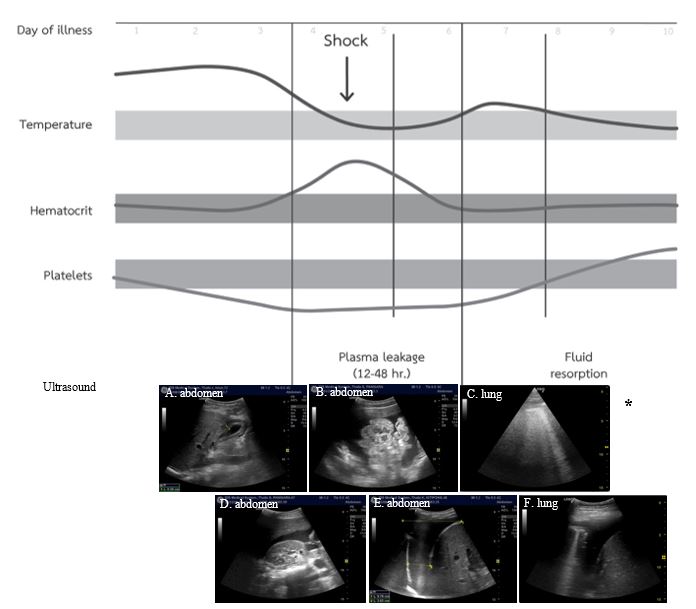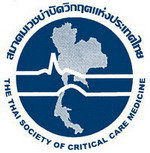Treatment of adults with severe dengue in Thailand.
DOI:
https://doi.org/10.54205/ccc.v30.255725Keywords:
Treatment, Adult, Severe dengue, Dengue shock, ThailandAbstract
Key measures for improving the survival rate in dengue shock patients are an early and appropriate diagnosis and treatment together with close monitoring by early provision of appropriate types, rates, objectives, and limits (TROLs) of fluid therapies, especially in the critical phase of the disease. The hemodynamic assessments to guide fluid resuscitation should mainly rely on clinical signs, hematocrit along with non-invasive monitoring tools. These concepts aim to maintain adequate oxygen delivery to the vital organs, to prevent a prolonged shock stage and subsequent organ failures. Diagnosis and treatment for poor tissue perfusion should be initiated as early as possible from the onset of the cytokine cascade-induced plasma leakage and disruption of the glycocalyx layer of the vascular endothelial cells.
Downloads
References
Dengue and severe dengue. [accessed 25 June, 2021]. Available at: https://www.who.int/news-room/fact-sheets/detail/dengue-and-severe-dengue.
Dengue 2563. [accessed 25 June, 2021]. Available at: https://drive.google.com/drive/folders/1TMgLhkY6HdECAy2IAC6R_bchoPWz99BH.
Zeng Z, Zhan J, Chen L, Chen H, Cheng S. Global, regional, and national dengue burden from 1990 to 2017: A systematic analysis based on the global burden of disease study 2017. EClinicalMedicine 2021;32:100712.
Basu A, Chaturvedi UC. Vascular endothelium: the battlefield of dengue viruses. FEMS Immunology & Medical Microbiology 2008;53:287-99.
Trung DT, Wills B. Systemic vascular leakage associated with dengue infections–The clinical perspective. Dengue Virus 2010:57-66.
Chen C-M, Chan K-S, Yu W-L, Cheng K-C, Chao H-C, Yeh C-Y, et al. The outcomes of patients with severe dengue admitted to intensive care units. Medicine 2016;95.
World health organization, Research SPf, Diseases TiT, Diseases WHODoCoNT, Epidemic WHO, Alert P. Dengue: guidelines for diagnosis, treatment, prevention and control: World Health Organization; 2009.
Ranjit S, Kissoon N, Gandhi D, Dayal A, Rajeshwari N, Kamath SR. Early differentiation between dengue and septic shock by comparison of admission hemodynamic, clinical, and laboratory variables: a pilot study. Pediatric emergency care 2007;23:368-75.
Yacoub S, Wertheim H, Simmons CP, Screaton G, Wills B. Microvascular and endothelial function for risk prediction in dengue: an observational study. The Lancet 2015;385:S102.
Evans L, Rhodes A, Alhazzani W, Antonelli M, Coopersmith CM, French C, et al. Surviving sepsis campaign: international guidelines for management of sepsis and septic shock 2021. Intensive care medicine 2021:1-67.
World health organization, UNICEF. Handbook for clinical management of dengue. 2012.
Teparrukkul P, Hantrakun V, Day NP, West TE, Limmathurotsakul D. Management and outcomes of severe dengue patients presenting with sepsis in a tropical country. PloS one 2017;12:e0176233.
Thanachartwet V, Wattanathum A, Sahassananda D, Wacharasint P, Chamnanchanunt S, Khine Kyaw E, et al. Dynamic measurement of hemodynamic parameters and cardiac preload in adults with dengue: a prospective observational study. PLoS One 2016;11:e0156135.
Yacoub S, Trung TH, Lam PK, Thien VHN, Hai DHT, Phan TQ, et al. Cardio-haemodynamic assessment and venous lactate in severe dengue: Relationship with recurrent shock and respiratory distress. PLoS neglected tropical diseases 2017;11:e0005740.
Hernández G, Ospina-Tascón GA, Damiani LP, Estenssoro E, Dubin A, Hurtado J, et al. Effect of a resuscitation strategy targeting peripheral perfusion status vs serum lactate levels on 28-day mortality among patients with septic shock: the ANDROMEDA-SHOCK randomized clinical trial. Jama 2019;321:654-64.
Cecconi M, Hernandez G, Dunser M, Antonelli M, Baker T, Bakker J, et al. Fluid administration for acute circulatory dysfunction using basic monitoring: narrative review and expert panel recommendations from an ESICM task force. Intensive care medicine 2019;45:21-32.
Pelosi P. Controversies in intensive care medicine. Springer. 2009.
Najia Hassan SM, Prasun Bhattacharjee, Rajshree Sinha. Bed side prognostic markers for dengue fever: serum lactate, base excess and central peripheral temperature gradient. Transactions of the Royal Society of Tropical Medicine and Hygiene;4:2041-5.
Thanachartwet V, Desakorn V, Sahassananda D, Jittmittraphap A, Oer-Areemitr N, Osothsomboon S, et al. Serum procalcitonin and peripheral venous lactate for predicting dengue shock and/or organ failure: a prospective observational study. PLoS neglected tropical diseases 2016;10:e0004961.
Jones AE, Shapiro NI, Trzeciak S, Arnold RC, Claremont HA, Kline JA, et al. Lactate clearance vs central venous oxygen saturation as goals of early sepsis therapy: a randomized clinical trial. Jama 2010;303:739-46.
Myburgh JA, Mythen MG. Resuscitation fluids. New England Journal of Medicine 2013;369:1243-51.
Nhan NT, Phuong CXT, Kneen R, Wills B, Van My N, Phuong NTQ, et al. Acute management of dengue shock syndrome: a randomized double-blind comparison of 4 intravenous fluid regimens in the first hour. Clinical Infectious Diseases 2001;32:204-13.
Wills BA, Dung NM, Loan HT, Tam DT, Thuy TT, Minh LT, et al. Comparison of three fluid solutions for resuscitation in dengue shock syndrome. New England Journal of Medicine 2005;353:877-89.
Dung N, Day N, Tam D, Loan H, Chau H, Minh L, et al. Fluid replacement in dengue shock syndrome: a randomized, double-blind comparison of four intravenous-fluid regimens. Clinical Infectious Diseases 1999;29:787-94.
Semler MW, Self WH, Wanderer JP, Ehrenfeld JM, Wang L, Byrne DW, et al. Balanced crystalloids versus saline in critically ill adults. New England Journal of Medicine 2018;378:829-39.
Mekmullica J, Suwanphatra A, Thienpaitoon H, Chansongsakul T, Cherdkiatkul T, Pancharoen C, et al. Serum and urine sodium levels in dengue patients. Southeast Asian J Trop Med Public Health 2005;36:197-9.
Reddy AA, Reddy TP, Pranam G, Pranam U, Manjunathe G. Serum sodium as a prognostic marker in dengue fever cases admitted to PICU in Navodaya hospital, Raichur, India. Int J Contemp Pediatr 2017;4:222-5.
Attalla HA, Abulkassem MS, Elenine KMA. Assessment of intraoperative use of ringer acetate in patients with liver cirrhosis, Alex. J. Anaesth. Intensive Care 2005;8:75-82.
Mendez CM, McClain CJ, Marsano LS. Albumin therapy in clinical practice. Nutrition in clinical practice 2005;20:314-20.
au SSIsgoacac. Impact of albumin compared to saline on organ function and mortality of patients with severe sepsis. Intensive care medicine 2011;37:86-96.
Zeng Y, Adamson RH, Curry F-RE, Tarbell JM. Sphingosine-1-phosphate protects endothelial glycocalyx by inhibiting syndecan-1 shedding. American Journal of Physiology-Heart and Circulatory Physiology 2014;306:H363-H72.
Wiedermann CJ. Resuscitation with hyperoncotic colloids in the intensive care unit. Intensive care medicine 2009;35:381-.
Chuansumrit A, Phimolthares V, Tardtong P, Tapaneya-Olarn C, Tapaneya-Olarn W, Kowsathit P, et al. Transfusion requirements in patients with dengue hemorrhagic fever. Southeast Asian journal of tropical medicine and public health 2000;31:10-4.
Lindgren L, Yli‐Hankala A, Halme L, Koskimies S, Orko R. Transfusion‐related acute lung injury (TRALI) after fresh frozen plasma in a patient with coagulopathy. Acta anaesthesiologica scandinavica 1996;40:641-4.
Kalayanarooj S. Clinical manifestations and management of dengue/DHF/DSS. Tropical medicine and health 2011:1112080193-.
Kalayanarooj S. Choice of colloidal solutions in dengue hemorrhagic fever patients. J Med Assoc Thai 2008;91:S97-103.
Services DoM. Guidelines for Diagnosis and Treatment of Dengue Patients in Adults. 2020.
Schött U, Kander T, Bentzer P. Effects of Dextran-70 and albumin on coagulation in experimental hemorrhage in the Guinea pig. Shock (Augusta, Ga.) 2018;50:366.
Davidson I. Renal impact of fluid management with colloids: a comparative review. European journal of anaesthesiology 2006;23:721-38.
Mailloux L, Swartz CD, Capizzi R, Kim KE, Onesti G, Ramirez O, et al. Acute renal failure after administration of low-molecular-weight dextran. New England Journal of Medicine 1967;277:1113-8.
Wongsa A. Fluid and hemodynamic management in severe dengue. Southeast Asian J Trop Med Public Health 2015;46:123-7.
Organization WH. Dengue haemorrhagic fever: diagnosis, treatment, prevention and control: World Health Organization; 1997.
McLean AS. Echocardiography in shock management. Critical Care 2016;20:1-10.
Porter TR, Shillcutt SK, Adams MS, Desjardins G, Glas KE, Olson JJ, et al. Guidelines for the use of echocardiography as a monitor for therapeutic intervention in adults: a report from the American Society of Echocardiography. Journal of the American Society of Echocardiography 2015;28:40-56.
Lichtenstein DA, Meziere GA. Relevance of lung ultrasound in the diagnosis of acute respiratory failure*: the BLUE protocol. Chest 2008;134:117-25.
De Backer D, Biston P, Devriendt J, Madl C, Chochrad D, Aldecoa C, et al. Comparison of dopamine and norepinephrine in the treatment of shock. New England Journal of Medicine 2010;362:779-89.
Rajapakse S, de Silva NL, Weeratunga P, Rodrigo C, Fernando SD. Prophylactic and therapeutic interventions for bleeding in dengue: a systematic review. Transactions of the Royal Society of Tropical Medicine and Hygiene 2017;111:433-9.
Trunfio M, Savoldi A, Viganò O, Monforte AdA. Bacterial coinfections in dengue virus disease: what we know and what is still obscure about an emerging concern. Infection 2017;45:1-10.
See KC, Phua J, Yip HS, Yeo LL, Lim TK. Identification of concurrent bacterial infection in adult patients with dengue. The American journal of tropical medicine and hygiene 2013;89:804.
Syue L-S, Tang H-J, Hung Y-P, Chen P-L, Li C-W, Li M-C, et al. Bloodstream infections in hospitalized adults with dengue fever: Clinical characteristics and recommended empirical therapy. Journal of Microbiology, Immunology and Infection 2019;52:225-32.
Regli A, Pelosi P, Malbrain ML. Ventilation in patients with intra-abdominal hypertension: what every critical care physician needs to know. Annals of intensive care 2019;9:1-19.
Balfour-Lynn R, Marsh G, Gorayi D, Elahi E, LaRovere J. Non-invasive ventilation for children with acute respiratory failure in the developing world: literature review and an implementation example. Paediatric respiratory reviews 2014;15:181-7.
Rochwerg B, Brochard L, Elliott MW, Hess D, Hill NS, Nava S, et al. Official ERS/ATS clinical practice guidelines: noninvasive ventilation for acute respiratory failure. European Respiratory Journal 2017;50.
Hess DR, Kacmarek RM. Essentials of mechanical ventilation: McGraw Hill Education.; 2019.
Rogers WK, Garcia L. Intraabdominal hypertension, abdominal compartment syndrome, and the open abdomen. Chest 2018;153:238-50.
Kirkpatrick AW, Roberts DJ, Coccolini F. Intra-abdominal hypertension, abdominal compartment syndrome and the open abdomen: looking beyond the obvious to new understandings in pathophysiology, harm-reduction and systemic therapies. Intensive Care for Emergency Surgeons. Springer; 2019. p 237-61.
Min M, Aye M, Shwe T, Swe T. Hydrocortisone in the management of dengue shock syndrome. The Southeast Asian journal of tropical medicine and public health 1975;6:573-9.
Tassniyom S, Vasanawathana S, Chirawatkul A, Rojanasuphot S. Failure of high-dose methylprednisolone in established dengue shock syndrome: a placebo-controlled, double-blind study. Pediatrics 1993;92:111-5.
Bandara SR, Herath H. Effectiveness of corticosteroid in the treatment of dengue–a systemic review. Heliyon 2018;4:e00816.

Downloads
Published
How to Cite
Issue
Section
License
Copyright (c) 2022 The Thai Society of Critical Care Medicine

This work is licensed under a Creative Commons Attribution-NonCommercial 4.0 International License.




